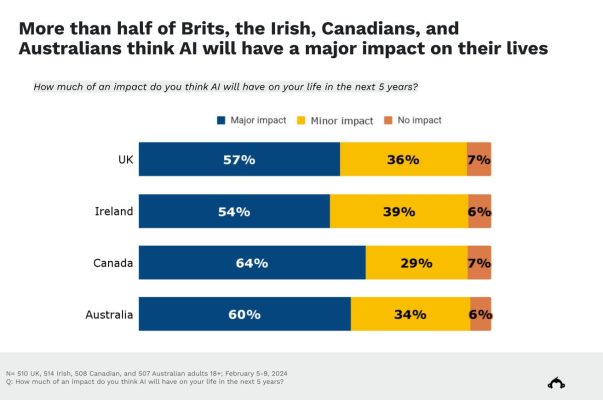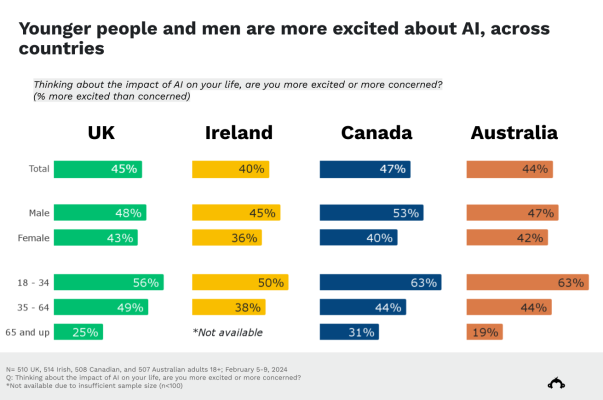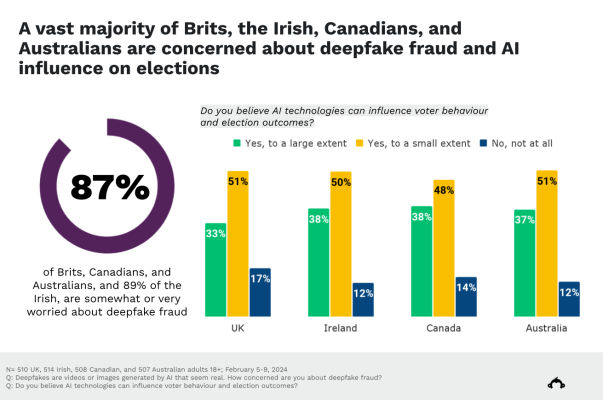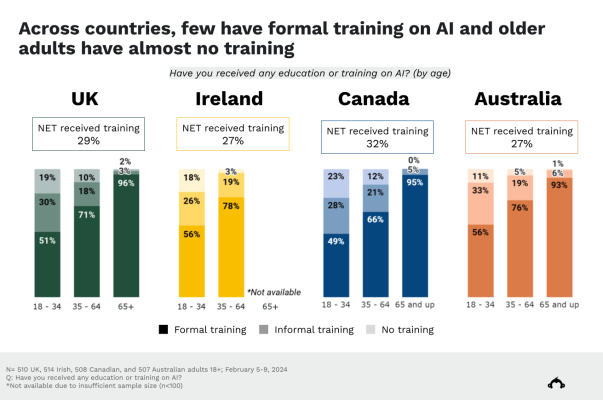Key findings:
- Across the UK, Ireland, Canada, and Australia, most think that AI will have some impact on their lives in the next five years, either a major impact (57% UK, 54% Ireland, 64% Canada, 60% Australia) or a minor impacts (36% UK, 39% Ireland, 29% Canada, 34% Australia).
- Younger people are more excited about AI, while older adults are more concerned. In the UK, 56% of those ages 18-34 are more excited than concerned, compared with 49% of those ages 35-64 and just 25% of those ages 65 and up; similar patterns follow in the other three countries.
- Many are concerned about deepfake fraud and the impact of AI on elections; more than 80% of adults in each country believe that AI technologies can influence voter behavior and election outcomes, with over one third believing it could have a large influence.
- In each country, around seven in ten adults have no training on AI at all (70% in the UK, 73% in Ireland, 67% in Canada, and 73% in Australia), and older adults are much less likely to have any training.
Most think AI will soon have an impact on their lives, with younger people and men more excited about it
Across the UK, Ireland, Canada, and Australia, artificial intelligence (AI) is on everyone’s minds. According to a new SurveyMonkey poll conducted February 5-9, eight in ten adults in those countries have heard or read “a lot” or “some” about AI (81% in the UK, 77% in Ireland, 83% in Canada, and 80% in Australia).

Most think that AI will have an impact on their lives in the next five years, either a major impact (57% UK, 54% Ireland, 64% Canada, 60% Australia) or a minor impact (36% UK, 39% Ireland, 29% Canada, 34% Australia). Only 6-7% in each country believe AI will have no impact on their lives. Younger adults ages 18-34 in each country are more likely to think that AI will have a major impact on their lives than older adults 65+.

Across all four countries, younger people are more excited about AI, while older adults are more concerned. In the UK, 56% of those ages 18-34 are more excited than concerned, compared with 49% of those ages 35-64 and just 25% of those ages 65 and up. Similar patterns follow in the other three countries: 63%, 44%, and 31%, respectively, in Canada; 63%, 44%, and 19%, respectively, in Australia; and 50% for 18-34 year olds and 38% for 35-64 year olds in Ireland. In both Ireland and Canada, men (45% in Ireland; 53% in Canada) were more excited about AI than women (36% in Ireland; 40% in Canada).
Across countries, many have concerns about deepfakes and election influence
In the UK, Ireland, Canada, and Australia, only about half the population are confident that they can tell when they are interacting with AI, or that they can identify AI-generated content such as articles or images. Younger people are more confident in their abilities; 64% of those ages 18-34 in the UK, 63% in Ireland, 70% in Canada, and 69% in Australia are confident in their ability to identify AI-generated content, compared with much lower percentages of those ages 35-64 (44% in the UK and Ireland, 52% in Canada, and 47% in Australia) and those ages 65 and up (22% in the UK, 20% in Canada, and 14% in Australia).

Relatedly, 87% of British, Canadian, and Australian adults and 89% of Irish adults are somewhat or very worried about deepfakes (videos or images generated by AI that seem real). More than 80% in each country believe that AI technologies can influence voter behavior and election outcomes, with over one third believing it could have a large influence. More than half also believe that AI will have a negative impact on the integrity and fairness of elections.
More than a third would trust AI to help with investing and medical advice
While worried about the potential for AI fraud, many are more trusting of it for important tasks like investing and getting medical advice. One-third or more in each country trust AI “a great deal” or “a fair amount” to help them decide how to invest their savings (37% in the UK, 32% in Ireland, 44% in Canada, and 33% in Australia) and to give medical advice (41% in the UK, 32% in Ireland, 46% in Canada, and 38% in Australia). Closer to two-thirds trust AI to help with work or school tasks or planning a trip.
In all four countries, younger people also trust AI with their personal data. In the UK, 76% of those ages 18-34 trust AI with some of their personal data, compared with 63% of those ages 35-64 and 47% of those ages 65 and up (83%, 71%, and 52%, respectively, in Canada; 70%, 58%, and 44% in Australia, and 75% of those ages 18-34 and 59% of those ages 35-64 in Ireland).
Few have formal training in AI, especially among older adults

Formal training in AI, like taking a class or seminar, is rare across all four countries (11% in the UK, 7% in Ireland, 13% in Canada, and 6% in Australia), and even informal training is not common. In each country, around seven in ten adults have no training on AI at all (70% in the UK, 73% in Ireland, 67% in Canada, and 73% in Australia). Older adults are much less likely to have any training – in the UK, only 4% of those ages 65 and up say they have any training in AI, compared with 49% of 18-34 year olds and 29% of 35-64 year olds. Similar patterns can be seen in Ireland (44% of 18-34 year olds and 22% of 35-64 year olds), Canada (51%, 34%, and 5%, respectively), and Australia (44%, 24%, and 7%).
Workers across countries are concerned about the impact of AI on their jobs. Canadians are the most worried, with 53% concerned about the impact, followed by the British (45%), Australians (42%), and the Irish (40%). However, using AI may improve worker productivity; among those who have used AI in their jobs, about three quarters say it has made them more productive at work (77% in the UK, 69% in Ireland, 75% in Canada, and 78% in Australia).
Read more about our polling methodology here.
Click through all the results in the interactive toplines below:



